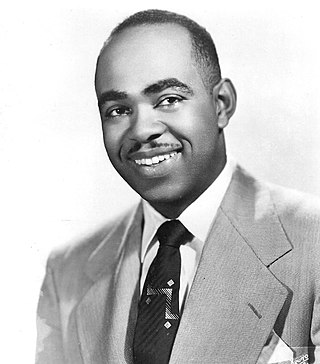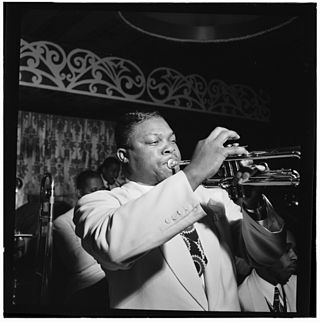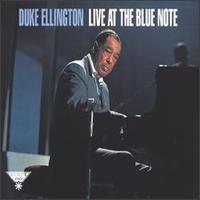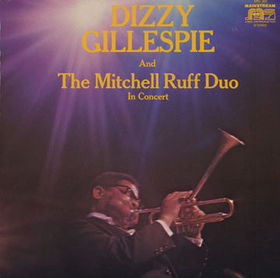
William Clarence Eckstine was an American jazz and pop singer and a bandleader during the swing and bebop eras. He was noted for his rich, almost operatic bass-baritone voice. In 2019, Eckstine was posthumously awarded the Grammy Lifetime Achievement Award "for performers who, during their lifetimes, have made creative contributions of outstanding artistic significance to the field of recording". His recording of "I Apologize" was given the Grammy Hall of Fame Award in 1999. The New York Times described him as an "influential band leader" whose "suave bass-baritone" and "full-throated, sugary approach to popular songs inspired singers such as Earl Coleman, Johnny Hartman, Joe Williams, Arthur Prysock, and Lou Rawls."

Benjamin Francis Webster was an American jazz tenor saxophonist.

Al Grey was an American jazz trombonist who was a member of the Count Basie orchestra. He was known for his plunger mute technique and wrote an instructional book in 1987 called Plunger Techniques.

Wild Bill Davis was the stage name of American jazz pianist, organist, and arranger William Strethen Davis. He is best known for his pioneering jazz electric organ recordings and for his tenure with the Tympany Five, the backing group for Louis Jordan. Prior to the emergence of Jimmy Smith in 1956, Davis was the pacesetter among organists.

Russell Keith Procope was an American clarinetist and alto saxophonist who was a member of the Duke Ellington orchestra.

William Alonzo "Cat" Anderson was an American jazz trumpeter known for his long period as a member of Duke Ellington's orchestra and for his wide range, especially his ability to play in the altissimo register.

Gerald Stanley Wilson was an American jazz trumpeter, big band bandleader, composer, arranger, and educator. Born in Mississippi, he was based in Los Angeles from the early 1940s. He arranged music for Duke Ellington, Sarah Vaughan, Ray Charles, Julie London, Dizzy Gillespie, Ella Fitzgerald, Benny Carter, Lionel Hampton, Billie Holiday, Dinah Washington, and Nancy Wilson.
William Melvin Mitchell was an American jazz tenor saxophonist.

Jazz Party is a 1959 album by Duke Ellington and His Orchestra which contains a "formidable gallery of jazz stars" guesting, including Dizzy Gillespie and Jimmy Rushing. It featured also a 9-strong percussion section on two tracks.

Charles Lawrence Persip, known as Charli Persip and formerly as Charlie Persip, was an American jazz drummer.

Granville William "Mickey" Roker was an American jazz drummer.
Willie Cook was an American jazz trumpeter.

Live at the Blue Note is a live album by American pianist, composer and bandleader Duke Ellington recorded at The Blue Note nightclub in Chicago for the Roulette label in 1959.

A Portrait of Duke Ellington is an album featuring trumpeter Dizzy Gillespie and orchestra performing compositions associated with Duke Ellington, recorded in 1960 and released on the Verve label. All of the orchestral arrangements were provided by then Hi-Lo's accompanist – and sometimes arranger – Clare Fischer, hired on the basis of a previously recorded but unreleased album with strings, arranged by Fischer for erstwhile University of Michigan classmate Donald Byrd. Byrd played the tape for Gillespie; Gillespie liked what he heard. Unfortunately for Fischer, especially in light of the critical accolades given the eventual fruit of his, and Gillespie's, labor, Fischer's name was nowhere to be found on the finished LP; widespread awareness of his participation would have to await the CD reissue almost 2½ decades later.

Dizzy Gillespie and the Mitchell Ruff Duo in Concert is a live album by trumpeter Dizzy Gillespie and the Mitchell-Ruff Duo recorded at Dartmouth College in 1971 and released on the Mainstream label.
While the French horn is primarily used in classical music pieces, in the mid-20th century it broke into the jazz world. While the instrument remains relatively rare, the role of the French horn in jazz has developed from its beginnings in the 1940s through to the 2010s. Note that the expression "horns" in jazz is often used colloquially to refer to all wind instruments used in jazz
This is the discography for American jazz musician Clare Fischer.
Dwike Mitchell was an American piano player and teacher. He began his career as pianist for the Lionel Hampton Orchestra before joining Willie Ruff to form The Mitchell-Ruff Duo jazz group.

Charlie Smith, was an American jazz drummer.













